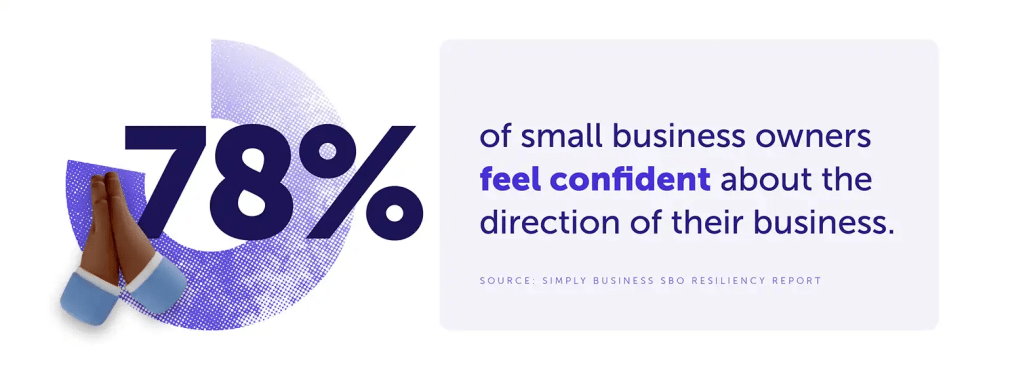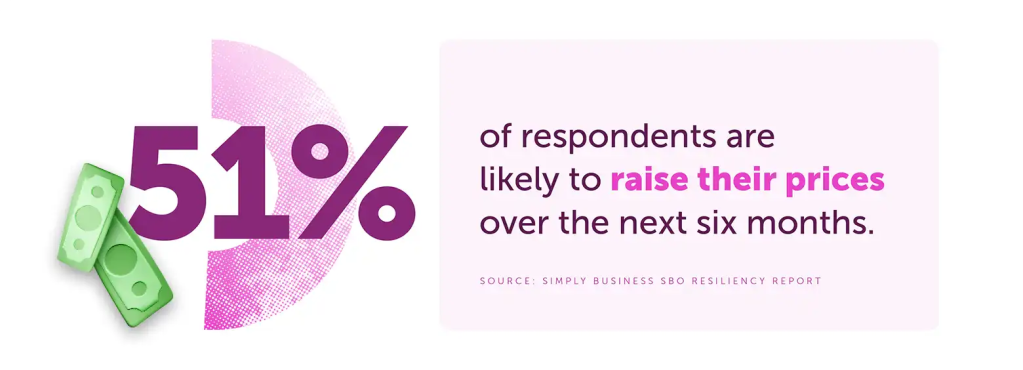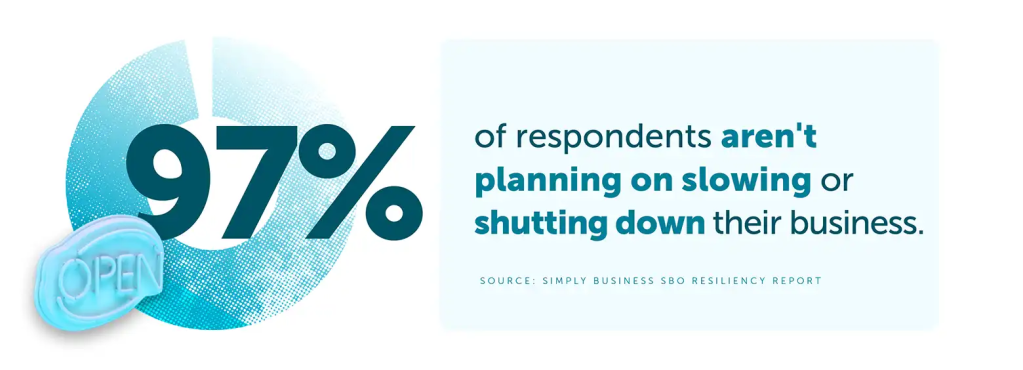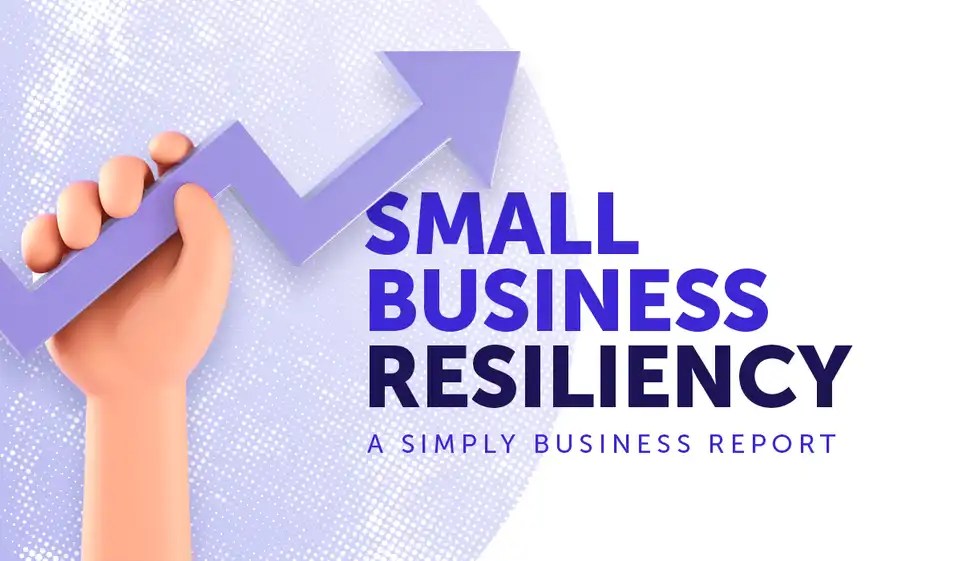Small business owners have faced a number of challenges in just a handful of years – and those challenges don’t look to be going away anytime soon. With talks of a looming recession on the horizon, it would be easy to assume that small business owners feel uncertain about their futures.
Happily, that may not be the case.
In a recent survey conducted by Simply Business, we asked 539 small business owners to tell us about how they’re doing in a post-pandemic world. The overall theme? These small business owners are feeling prepared, resilient, and cautiously optimistic.
Here are the biggest takeaways.

Takeaway #1: Even with potential economic trouble ahead, small business owners still plan on growing (42%).
No slowing down here – 42% of respondents are currently growing and expanding their businesses. Additionally, 78% of business owners said that they are very confident (37%) or fairly confident (41%) in their business’s prospects over the next six months. These responses echo the optimism many of the surveyed owners had that they can weather economic storms and come out financially healthy on the other side.
While that may seem to fly in the face of current trends, Scott Keefe, Director of Simply Business’s Customer Solutions Center, offers this perspective, “Whether you call it ‘making a leap’ or ‘taking the plunge,’ there’s often so much momentum when you first start out, it’s hard not to keep moving forward.”
Takeaway #2: Small business owners expect profits to remain unchanged (20%) or grow (46%).
Despite talk of economic turmoil, the small business owners we spoke with remain unfazed – our survey showed that 20% of respondents expect their profits to remain the same as the previous year.
Additionally, 46% of respondents expect their profits to grow from last year.
“These responses show that the majority of small business owners remain optimistic about their profits,” says Liz Cangelosi, Director of Brand Marketing at Simply Business. “It really speaks to the character of how resilient and focused small business owners are, even in the face of a possible downturn in the economy.”

Takeaway #3: Small business owners are fairly likely (32%) or very likely (23%) to raise prices over the next six months.
With inflation on the rise, it’s no wonder some small business owners may be considering adjusting their prices. In fact, 55% of survey respondents said that they’re likely to raise their prices within the next six months.
While increasing prices is a likely response to inflation, it also may be another indicator of the guarded confidence business owners showed in the survey. “Businesses raise prices for a number of reasons,” says Keefe. “It could be because they have a product or service they know their customers need, and are willing to pay for, or they’ve added products or services that are in high demand.”
Takeaway #4: While some may not be hiring (32.3%), many small business owners are unlikely to downsize (63%).
With many larger companies downsizing in preparation for economic tightening, many small business owners want to keep their workforce in place, according to our survey. Along with the general feeling of confidence among small business owners, there could be a variety of reasons at play here.
Good help can be hard to find.
While many economic indicators may be trending in a negative direction, the unemployment rate doesn’t appear to be one of them. For a small business owner, finding good help can consume both time and money. This investment could increase even more with a tight labor market.
Maybe just as important, it can also take an owner away from other important parts of running their business, such as attracting new customers and clients, or managing the financial side of the operation. Hanging onto top-notch employees – even during an economic downturn – may make financial sense in the long run.
For some owners, even saving on wages and salaries in the short term may not be the best decision. “In a lot of small businesses, employees can wear many hats,” says Keefe. “If you lay off a landscaper who’s also very good at fixing and maintaining your equipment, it’s like you’re down two roles instead of just one.”
Family affair.
There also can be an emotional component in the decision to hold pat. In small businesses, with just a handful of people, owners and employees can become much like family members. It can be a lot harder to let someone go that you’ve been working with closely day-in and day-out.

Takeaway #5: The majority of small business owners aren’t going anywhere (97%).
You’ve heard the old adage: Small business owners are the backbone of America.
And that backbone may as well be made of steel. 97% of respondents told us that they aren’t planning on shutting down their businesses, even in the face of any looming recessions.
For many small business owners, doing what they do is more than just a way to generate income. When survey respondents were asked why they became small business owners, nearly 37% replied they wanted freedom to control their schedules, career path, and work environment. 24% said they wanted to turn their passion and skills into a business.
Too legit to quit.
Starting a small business is often a dream that’s been years in the making. For many owners, the survey results seem to indicate that the benefits of running their own business outweigh the obstacles and hurdles that come with the territory. They’re not stopping now.
“For a lot of the owners we work with, it’s taken a good deal of courage and resourcefulness to make that leap. They’re determined to make it work.” says Cangelosi. “It’s like that motivational quote you often see that says ‘I didn’t come this far, only to come this far.’ ”
Resiliency Matters
No matter what the 2023 year brings us, we know one thing for sure: small business owners are ready for anything.
“Ultimately, this survey really showed us that small business resiliency is stronger than ever,” says Cangelosi. “But we really didn’t need a survey to show us that. We’re constantly in awe of how our customers just roll with the punches, and we hope to learn from them on what it means to be truly adaptable during tough economic times.”
